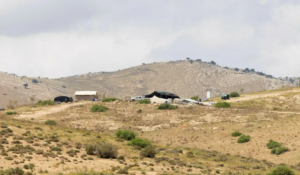Israeli Cabinet approves construction of 22 new settlements, some deep in West Bank

An Israeli outpost established during the Israel-Gaza war in the West Bank’s northern Jordan Valley, pictured in April 2025
Hagar Shezaf reports in Haaretz on 28 May 2025:
Israel’s government voted two weeks ago to establish 22 new settlements in the West Bank, including the legalization of nine unauthorized outposts.
Some of the new settlements are slated for remote areas deep inside the West Bank, such as Mount Ebal, a secluded hill which currently does not have settlements, located between Palestinian villages near Nablus, and Sa-Nur, where a former settlement was dismantled during the 2005 disengagement.
The decision also formalizes the Homesh outpost, built on the site of another settlement evacuated in 2005.
The move was promoted by far-right Finance Minister Bezalel Smotrich, who also holds a portfolio in the defense ministry, with backing from the ministry’s legal advisers. One of Smotrich’s first steps in office was to shift legal oversight of West Bank construction from the IDF Military Advocate General’s office to the Defense Ministry’s own legal department – in a bid to advance settler interests.
The decision states that Smotrich will launch the necessary planning work to establish and legalize the new settlements and outposts – a process expected to take several years. It also authorizes the Government Procurement Administration to allocate land to the Israeli Settlement Division for this purpose.
Although the decision was made two weeks ago, ministers had not made it public until Tuesday, when the West Bank Binyamin Regional Council – headed by Smotrich ally Israel Gantz – issued a statement.
One of the planned settlements is set to be built on Mount Ebal near Nablus, where settlers identify an archaeological site as the biblical altar of Joshua Ben Nun and frequently visit.
Three settlements are to be established in the Binyamin Regional Council area – Atarot Ader, Inbar, and North Beit Horon; three in the Jordan Valley Regional Council – Ir Hatmarim, Gevonit, and Tevetz; two in the Shomron Regional Council – El-Naveh and Rehavam; and two more in Gush Etzion and South Hebron.
Some of the outposts to be legalized are already in the process of being reclassified as neighborhoods of existing settlements. Now, they will be separated and recognized as independent settlements.
This article is reproduced in its entirety
